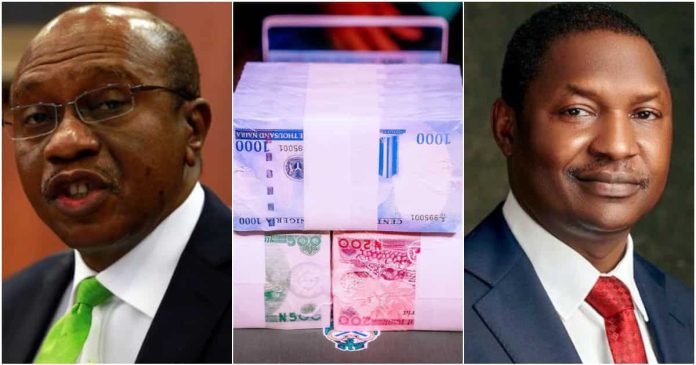Multiple state governments are planning to initiate legal proceedings against the Attorney-General of the Federation and Minister of Justice, Abubakar Malami, SAN, and the Governor of the Central Bank of Nigeria, Godwin Emefiele, due to their refusal to implement the Supreme Court’s decision on the naira redesign policy of the Federal Government.
Last week, the Supreme Court issued an order stating that the old N1,000, N500, and N200 notes should remain in circulation alongside the new notes until December 31, 2023. However, the President’s lack of response to the ruling resulted in the rejection of the remaining old N1,000 and N500 notes as legal tender. Some banks initially complied with the Supreme Court’s ruling and began distributing the old notes, but they later stopped because the CBN claimed it had not given any directive to do so.
On Friday, the AGF received the enrolled order and Certified True Copy of the judgment, and the counsel for Kaduna, Kogi, and Zamfara states expects the government to comply with the ruling promptly. The non-service of the documents had allowed the government and the CBN to evade compliance with the Supreme Court’s decision.
Abdulhakeem Mustapha (SAN) is the legal counsel representing the states of Kaduna, Kogi, and Zamfara in a case against the Federal Government. He has stated that if the Federal Government does not comply with Supreme Court’s order, it will be pursued further.
Mustapha said, “The Attorney-General of the Federation has been served now and we will take it up from there; if there is no compliance now, we will commence committal proceedings against the attorney-general and the CBN governor. When the Supreme Court talks, the constitution makes it compulsory for all government representatives and everybody to comply with its order. It’s not discretional, you have to obey, it is the last and the final and that is why we have separation of power.
“The presence of separation of power is for checks and balances; when the Supreme Court talks, it must be complied with by all persons.”
Mustapha previously noted that, “We are waiting for the enrolled order of the court. We are yet to procure it. As soon as we have it, we will take the next step. When the Supreme Court talks, all organs of government comply and if they don’t comply, the rules are clear. We are going to activate the necessary legal steps within the ambit of the law. But we need to get the enrolled order and serve the defendants. That’s where we are.
“Anytime from now, we will be able to get the enrolled order and the Certified True Copy of the judgement, then we will take it up from there. But I can assure you, our clients are monitoring the situation and we will take appropriate steps at the right time.”
After the Supreme Court ruled that President Buhari’s directives to redesign the naira were unconstitutional, state governors, senior lawyers, and other stakeholders called on the President to instruct the CBN governor to allow both old and new notes to circulate to alleviate the scarcity of the currency, which has harmed the economy. However, the President and the CBN governor remained silent, which drew criticism from governors such as Nasir El-Rufai, Yahaya Bello, Bello Matawalle, and Rotimi Akeredolu.
Justice Agim, who delivered the ruling, criticized the President’s disregard for the court’s previous order to allow both old and new notes to circulate, stating that his recent broadcast which made only the N200 note legal tender undermined the country’s democracy.
Justice Agim said, “Let me consider the issue of the President’s disobedience of the 8-2-2023 interim order that the new and old versions of naira notes continue to circulate as legal tender until the determination of the pending application for interlocutory injunction. It is not in dispute that the 1st defendant refused to obey the said order.
“The President’s 16-2-2023 national broadcast reproduced here in pages 27-31 demonstrates this disobedience. In disobedience of the order, he directed that only the old N200 naira notes be re-circulated. Interestingly, there is nothing to show the implementation of even that directive. I agree with the 9th plaintiff that the 1st defendant is not entitled to be heard by this court when it has effused to respect the authority of this court and the authority of law from which the authority of the President and the government of Nigeria derives.
“The rule of law upon which our democratic governance is founded becomes illusory if the President of the country or any authority or person refuses to obey the orders of courts. The disobedience of orders of courts by the President in a constitutional democracy as ours is a sign of the failure of the constitution and that democratic governance has become a mere pretension and is now replaced by autocracy or dictatorship.”



